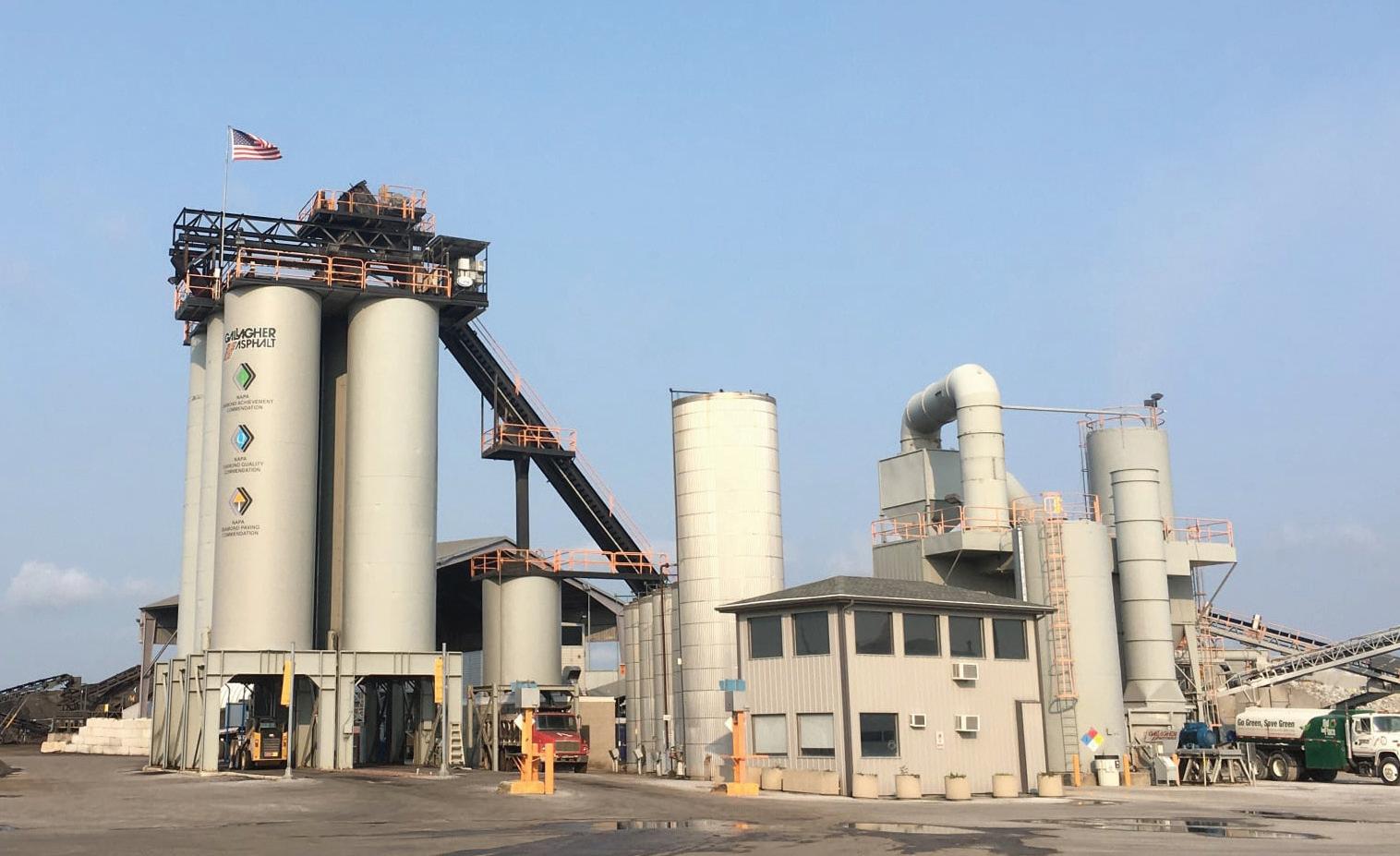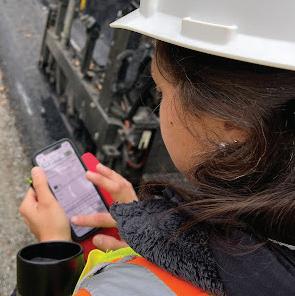
7 minute read
EDC-6 to Impact Asphalt Production Facilities
The Federal Highway Administration Every Day Counts initiative adds e-Ticketing to their innovation acceleration program

Since 2009, the Federal Highway Administration (FHWA) has supported new and better ideas to get highways planned, designed, built and maintained with the Every Day Counts (EDC) program. Now in its sixth cycle, EDC-6 Innovations for 2021-2022 includes several initiatives that FHWA feels will positively impact the industry and electronic ticketing is one of them that will directly impact asphalt plant owners and mix producers. "Highway construction projects produce massive amounts of valuable data. Historically, information such as materials tickets were communicated via paper," FHWA says. "Transportation agencies are improving on these paper processes by integrating them into electronic and digital workflows. Electronic ticketing (e-Ticketing) improves the tracking, exchange, and archiving of materials tickets.”
More than a dozen state DOTs, including Minnesota, Delaware and Pennsylvania, currently use e-Ticketing for construction contracts with 43 states committing to trying some form of the technology by 2022.
Due to the related safety concerns with COVID-19, State DOTs began to introduce specific e-Ticketing guidelines with a greater sense of urgency. Material producers took many steps to transition their scalehouse operations to e-Ticketing to promote social distancing. These
Gallagher Asphalt, Thornton, IL, uses a paperless process for truck planning, scheduling, e-Ticketing, digital timecards and faster invoicing/payment.
regulations are providing a clear path for contractors to implement an e-Ticketing platform, sooner rather than later. Will your plant be ready to comply?
STATES TAKE INITIATIVE
Because of its benefits, many states have been piloting e-Ticketing platforms since long before COVID and are seeing the benefits. "The state of Delaware (DelDot) right now has all of their hot mix asphalt producers and plants up and running fully digital," Matthew Valle, VP of Industry Relations at HaulHub, Inc. says. "That's 16 plants in Delaware that are now feeding into Delaware DOT's electronic portal."
The benefits of e-ticketing for states include: ➊ Increased safety: Removing the need for on-site ticket collection. ➋ Labor savings: Less paperwork and manual tabulation of material costs. ➌ Smoother roads: A paver that is low on material and begins to cool down can leave a bumpy surface. Knowing when new material will arrive allows for a consistent flow to the paver, resulting in smoother roads. ➍ Accurate accounting: Better recordkeeping of material usage improves planning for future projects. ➎ Reduced risk: Mitigates disputes over which plant material came from and whether appropriate routes were used.
The entire e-Ticketing process can enhance project delivery for an industry that is struggling with how to keep up with an increasing amount of work. "Right now, 41% of the industry will be retiring from construction over the next 10 years," Valle says. "We need to find ways to bridge that talent gap. We need to start putting pieces in place to help with this massive drain that's occurring in an industry that's not attracting people. Digital tools help."
The Minnesota DOT (MnDOT) has been ramping up the use of paperless technology for tracking deliveries of hot mix asphalt since 2018. MnDOT has seen the process improve safety and efficiency on road projects. "MnDOT construction projects require tons of hot mix asphalt each year, with over 188 road and bridge projects in the 2020 construction season alone," the Department said.
E-ticketing was used on 29 MnDOT
projects in 2020. MnDOT is facilitating an e-ticketing task force that includes the American Association of State Highway Transportation Officials (AASHTO), contractors, auditors, labor officials, asphalt producers and others. The group is developing recommendations for AASHTO MP39-19, intelligent construction specifications. Once e-ticketing recommendations are defined, they will be voted on by all 50 states and refined over seven years.
As a complement to the AASHTO group (which is developing the specifications), The National Construction Materials e-Ticketing Task Force, advised by Former FHWA Administrator Greg Nadeau, is facilitating the discussion on the practical implementation across the US. The Task Force, and public and private sector members, are working together to discuss and tackle the numerous practical challenges that come with moving from a paper-based world to a digital world.
RAPID GROWTH EXPECTED
With COVID expediting the use of e-Ticketing technology, the changes for the asphalt industry are going to happen very rapidly. "Nobody wanted to be the first one to do it," Valle says. "Now that there are DOTs that have a fairly robust system and framework for success set up, these things are starting to come together extremely rapidly. DOTs are saying, 'okay, there are solutions out there that can then help us get fully up and running and on board in very short order, so let's do it.'"
Change in the asphalt industry tends to happen slowly, but states are finding contractors who are willing to collaborate with them to get the process moving. "Pennsylvania has an e-Ticketing portal and are working with companies like Lindy Paving to get that data they need and into the portal in a manner that makes sense for the department," Valle says. "Between the asphalt paving associations, the DOT, e-Ticketing vendors and producers, we're all working together to get that information seamlessly transitioned in an efficient and standardized way."
That data is beneficial to the DOT, but also to the producers. "Right now, this structured data lives in a relational database stored at the plant and not all the time is that data even aggregated or accessible," Valle says. "e-Ticketing, facilitates the unlocking of that information and what this does is provides the producers with better insights into their customer base and their productivity. So instead of looking at manual printouts and spreadsheets, they can start to get those productivity insights in real-time to learn what they can be doing better to help service their customers and understand those customer dynamics."
With this collaboration, the model is now being set across the country for DOTs to work with associations and contractors to get everyone on the same page. Contractors will begin seeing the impact of this at an extremely rapid pace and they shouldn't be afraid to embrace it. "With technology accelerating rapidly, minds are being opened to the value of new ways of looking at old problems," Valle says, "It's the stuff that can actually help us be more productive and more intelligent by using data to give us better insights into the work. We see this push not only from the DOTs but also from producers who are gaining valuable insight to conduct their business in a more efficient way."

PAINLESS IMPLEMENTATION
As with any new process, contractors are reluctant to invest because of the cost and time associated with the change. With e-Ticketing, both perceived barriers are easily mitigated. "Change can be hard but once contractors experience how this can streamline their operations, they usually will understand this is something they need," Valle says. "It will help make them better communicators, help them get paid faster and help keep everyone safe as well."
And once you decide to proceed with implementation, vendors can get your company up and running fast. "We have an implementation team that will work with contractors and producers to get them going and get the information integrated into the necessary systems," Valle says. "Our training teams will work with them and get them trained so they are fully supported. It's a fairly painless process that can be ready to go in a week."
As more states ramp up their e-Ticketing requirements, producers need to be ready to comply.
How e-Ticketing Works
Historically, plant mixed asphalt has been weighed, tracked and paid for with computergenerated paper tickets. Paper ticketing isn’t an ideal process for a variety of reasons— on-site ticket collection poses safety risks, tickets can be easily lost, and data must be tabulated manually, just to name a few. e-Ticketing process begins at the asphalt plant, where workers load delivery trucks with hot mix asphalt. Under the traditional system, a computer generates a paper ticket, which includes relevant information such as the weight and cost of the asphalt.
With help from GPS tracking, e-Tickets record the amount of asphalt loaded, departure and arrival times and other information, according to MnDOT. Project managers and others can pull up the information in real-time on their smartphones or laptops.
The paperless process helps them track labor compliance information, such as prevailing wage monitoring, and improves safety because it eliminates the need to collect paper tickets in a busy work zone.
For more information, visit
ForConstructionPros.
com/21759337 .






